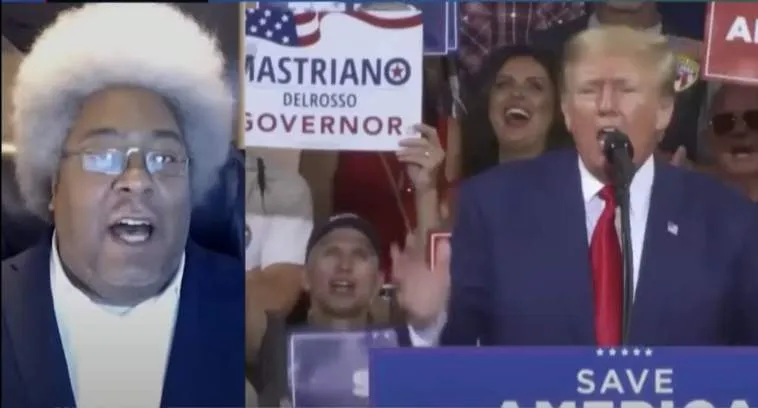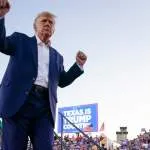(The Nation) Late Thursday evening, a Manhattan grand jury voted to bring charges against former president Donald Trump in connection with hush-money payments to actress Stormy Daniels. The specific charges are not yet known, though Manhattan District Attorney Alvin Bragg will likely announce them in the near future.
The indictment represents the first real attempt to hold Trump legally accountable for any of his many alleged crimes. But the odds that the path to real justice, let alone prison time, runs through the Manhattan DA’s office still seem very, very long.
Before we speculate about the charges or pull out our 3D chessboards and try to game out the legal and political stratagems behind the indictment, let’s remember the facts that have brought us to this point. In 2006, Trump had an affair with Daniels just months after his third wife, Melania, had given birth to their child. The story kicked around New York gossip circles for years, but in the waning days of the 2016 presidential election, Trump ordered his then-lawyer Michael Cohen to pay Daniels $130,000 in exchange for a contractual nondisclosure agreement about the affair.
The hush-money payment was not, in itself, illegal. But in 2018, The Wall Street Journal exposed the payment, and Trump violated the nondisclosure agreement by denying that the affair or the payment had ever taken place. This led Daniels to sue Trump. Her suit triggered a number of inquiries about the payment, along with questions about where Trump got the money.
Cohen initially lied to federal investigators, and Congress, about his participation in the scheme, but eventually Cohen came clean and confessed to a number of crimes he committed on behalf of Trump. (Cohen went to actual prison in 2019, lest you think crimes of this nature are not serious.) Cohen said that Trump recorded the payment as “legal fees,” which is a federal tax violation. Moreover, he said that Trump did not report the hush money as a campaign-related contribution, which would be a violation of federal election laws.
And then… nothing happened. Despite sitting on a mountain of evidence, including documents provided by Cohen, federal prosecutors in the Southern District of New York (SDNY) took no additional action against Trump. Some argued that Trump was immune from such federal prosecutions while he was president, but nobody has offered a good reason for why federal charges weren’t waiting for him on January 20, 2021, the moment he was out of power.
Enter the Manhattan DA’s office. With SDNY prosecutors under both Attorneys General Bill Barr and Merrick Garland completely failing in their responsibilities, only the Manhattan DA’s office was left to bring Trump to justice for this set of crimes. And that brings us to today’s indictments.
(An important reminder: This is only one of the many investigations into Trump or his businesses, and should not be confused with New York Attorney General Letitia James’s probe of the Trump Organization, or Fulton County District Attorney Fani Willis’s investigation of election fraud, or special counsel Jack Smith’s espionage inquiry, or Robert Mueller’s investigation into obstruction of justice—which everyone seems to have forgotten—or even the investigation into that pesky attempted coup, which nobody appears to want to deal with anymore.)
That Trump committed the crimes that are reportedly at the heart of the indictment is damn near a matter of public record. We know he paid Daniels. We know he lied about it. We know he obfuscated about where the money came from. Game, set, match. If these charges had been brought by a federal prosecutor in 2020 or 2021 at the very least, the indictments wouldn’t even be controversial outside of the white-wing media that remains in thrall to Trump. This is the lowest-hanging fruit (or, mushroom, to hear some tell it) in the Trump criminal matrix. This isn’t getting Al Capone for tax evasion; this is getting Al Capone for illegally serving alcohol at his underground poker game. It’s minor, but it’s also obvious. Criminal bookkeeping is just as ticky-tacky as it sounds, but all the available evidence shows that Trump did it. If law enforcement has enough time and energy to beat the snot out of a person who jumps a turnstile to get onto the subway (and they do), then they have enough resources to indict Trump for this tawdry crap.
The problem, as Alexa is quick to remind me, is that it’s not 2020 or 2021, and this is not in federal court. We are in the year 2023, and a local DA is trying to gather up some bits of the jurisdictional authority federal prosecutors left lying on the ground. It’s not a clean shot: Bragg is trying to bank in a half-court heave off the backboard after the shot clock buzzer has already sounded.
The first issue that Bragg has is time. Trump committed the underlying campaign finance offense in 2016, and the statute of limitations on bookkeeping fraud and campaign finance violations is five years. That brings you to 2021. The statute of limitations for tax evasion is three years. Even if you don’t start the clock on that until the story breaks in the news in 2018, that brings you, once again, to 2021. To get to 2023, Bragg appears to be arguing that the statute of limitations paused while Trump was president and living out of state. That’s… a theory, but not necessarily a good one, and certainly not one that has been tested enough to know how it’s going to hold up in the courts. Remember, the alleged immunity Trump had from prosecutions applied only at the federal level. Local prosecutors, like Bragg’s predecessor Cyrus Vance, who was the Manhattan DA during Trump’s presidency, could have charged him with this crime at any time.
The second issue is that Bragg is doing a lot of legal contortions to make this a felony, instead of a misdemeanor. For Bragg to charge Trump with felony bookkeeping fraud, he needs to show that Trump committed that crime to cover up some other crime (either a campaign finance violation or a tax violation) at the federal level. But that’s harder to do when the feds won’t prosecute Trump for the graver misdeeds that are beyond Bragg’s purview.






